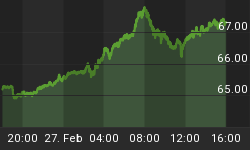We have written many times about the need for the Yuan to be a global currency and eventually a global reserve currency [one of several]. We have talked of how it had to develop its banking system before it could take such a journey. We highlighted the experiments that the Chinese were making first in Hong Kong then in Guanchow in using the Yuan in international dealings. More importantly we highlighted the consequences to other world currencies, in particular the U.S. Dollar, of the Yuan becoming a well used international trade currency. The day is now here when the Chinese are starting to propel the Yuan onto the international scene
These consequences of its arrival will come over time, but they could come overnight. One consequence is becoming even clearer, as we forecast, that the exchange rate of the Yuan will not rise much on foreign exchanges. Another is central banks will insure against currency crises in the future by holding gold.
We discussed just how Chinese exporters and importers could turn from a U.S. Dollar price to a Yuan price, thus emasculating the U.S. Dollar as quickly as it takes for banks and international traders to price their goods in the Yuan. If they act too quickly, the consequences could be chaotic for global foreign exchanges. If handled carefully the Dollar's international use will simply fade, producing major internal problems as these Dollars come home.
A number of the world's biggest banks have launched international road shows promoting the use of the Yuan to corporate customers instead of the Dollar for trade deals with China. HSBC and Standard Chartered are offering discounted transaction fees and other financial incentives to companies that choose to settle trade in the Yuan. Both banks are now capable of doing Yuan settlement in many parts of the world. All the other major international banks [such as Citigroup and JPMorgan] are rushing to join the fray with their own road shows. Beijing wants this to happen now. Chinese central bank officials are backing the banks in their efforts. Next year and beyond should see the Yuan standing next to the Euro and the U.S. Dollar on foreign exchanges.
Cross-border trade in Yuan totaled Yuan70.6 billion [$10 billion] in the first half of the year, 20 times the Yuan3.6 billion recorded in the second half of 2009. The eventual potential of global Yuan settled trades is 40 times this new level at $2,800 billion worth of goods and services settled in the U.S. Dollar and the Euro.
What will a Global Yuan lead to?
The development of the Yuan market will be rapid and very dramatic. Before we begin to discuss the consequences of this change to global trade let's reflect on some salient facts.
- For every Yuan transaction in Chinese trade, there will be one less U.S. Dollar or Euro trade.
- As with the U.S. Dollar international market, there will develop an offshore Yuan market. [MacDonald's (burger) has already achieved a Yuan raising offering]
- The Yuan will be capable of being used between among countries outside China in trade between themselves.
- Capital markets will always favor currencies that are based on a strong growing economy.
- Once international, the Yuan will take its place in central bank reserves.
Those are the facts, but what are the consequences for the global economy, the U.S. Dollar in international trade, Capital markets and as the globe's sole reserve currency, the gold market and for the price of gold?
The Consequences of a Global Yuan
We have to reserve this for Subscribers only. To get the full picture even as it develops over time, subscribe to our newsletter through www.GoldForecaster.com















